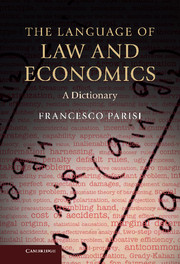M
Published online by Cambridge University Press: 04 August 2017
Summary
Majoritarian default rules: legal systems provide default rules to fill gaps in incomplete contracts. The existence of default rules allows parties to enter into a binding contractual relationship without having to specify all contingencies in the contract. A reduction in transaction costs is an important function of default rules. The term “majoritarian default rules” has been used in the law and economics literature to identify default rules that aim at reducing transaction costs. The term derives from the fact that, in choosing default rules, lawmakers and courts ask what the majority of parties in a similar contractual situation would have contracted for if they had had the opportunity to write a complete contract (Ayres and Gertner, 1999). By filling contractual gaps with majoritarian default rules, the largest possible number of parties avoid the need to draft their own contractual terms (Scott and Krauss, 2007). However, Ayres and Gertner (1989), in their work on default rules, have criticized a blind adherence to majoritarian default rules. They argue that, because of the costs and challenges of forcing a court to pick majoritarian default rules, there are instances when it would be preferable to select rules, whether accepted by the majority of contracting parties or not, that incentivize the parties to contract explicitly. They introduce the concept of penalty default rules as one alternative to majoritarian default rules. Penalty default rules are rules that would not be accepted by the majority of contracting parties and that place a penalty on one or both of the parties in the event of a dispute. The possibility of being penalized under a penalty default rule will generally spur the parties to draft explicit contract terms that eliminate any gaps. See also boilerplate, default rules, minoritarian default rules, penalty default rules, transaction costs, and normative Coase theorem.
- Type
- Chapter
- Information
- The Language of Law and EconomicsA Dictionary, pp. 173 - 190Publisher: Cambridge University PressPrint publication year: 2013



